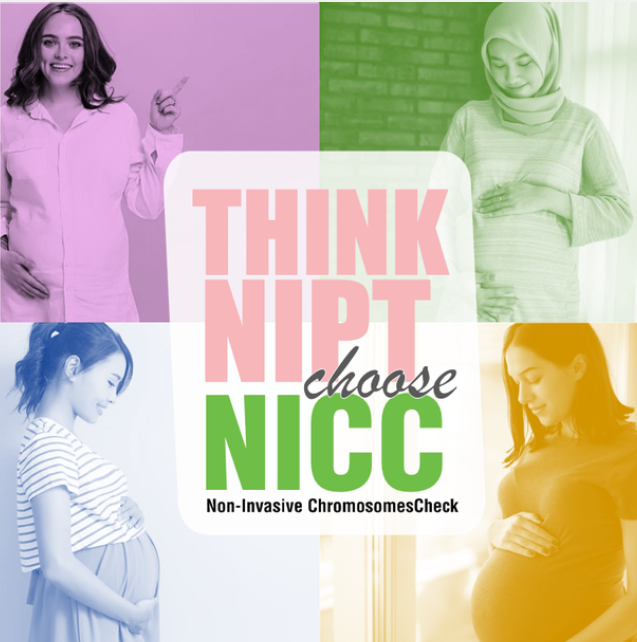NICC

Your safe & reliable choice for prenatal testing

Quick & simple blood test

Can be done as early as 10 weeks of pregnancy

High accuracy for Down Syndrome (Trisomy 21)

Gender prediction

Diagnostic test for high-risk cases

NICC® (Non-Invasive ChromosomesCheck) is a blood test that measures the amount of cell-free fetal DNA (cffDNA) in the mother’s blood. cffDNA is DNA from the placenta that enters the mother’s bloodstream during pregnancy.
The NICC® test can be used to assess the risk of Down Syndrome, Edwards Syndrome, Patau Syndrome and other chromosomal abnormalities as early as 10 weeks of pregnancy.
Who should consider NICC®?
- Any pregnant woman who wish to have early information about herbaby’s health
- Women with advanced maternal age (more than 35 years old )
- Personal or family history of birth defect
- Previous birth of a chlid with a birth defect
What does NICC® screen for?
The NICC® test screens for most common trisomies, sex chromosome aneuploidies and microdeletion/duplication
syndromes. It can also screen for other aneuploidies in all the 23 pairs of chromosomes, providing a genome-wide overview for fetal chromosomal abnormalities.
TRISOMY:
Down Syndrome (Trisomy 21)
Edwards Syndrome (Trisomy 18)
Patau Syndrome (Trisomy 13)
Trisomy 9, 16 and 22
and other chromosomes
SEX CHROMOSOME ANEUPLOIDIES:
Turner Syndrome (XO)
Klinefelter Syndrome (XXY)
Triple-X Syndrome (XXX)
Jacob’s Syndrome (XYY)
MICRODELETION SYNDROMES
1p36
2q33.1
16p12.2
DiGeorge Syndrome 2
Jacobsen Syndrome
Cri-du-chat Syndrome
Van der Woude Syndrome
Prader-Willi / Angelman Syndrome
GENDER IDENTIFICATION
Male (XY)
Female (XX)
How does NICC® work?
Cell-free fetal DNA (cffDNA) is genetic material that is released from the placenta and circulates in the mother’s blood during pregnancy (Picture 1).
cffDNA is present in a pregnant woman’s blood in small quantities starting in the first trimester and it increases throughout the pregnancy. NICC® detects the baby’s DNA and measures the risk of chromosomal abnormalities


The decision to go for NIPT is a personal one, and the counselling phase is important. Please make sure that you have carefully read and fully understood the characteristic, suitable users, purpose and necessity of NIPT, and been informed by your doctor on the limitations and possible risks before giving your consent for testing.
